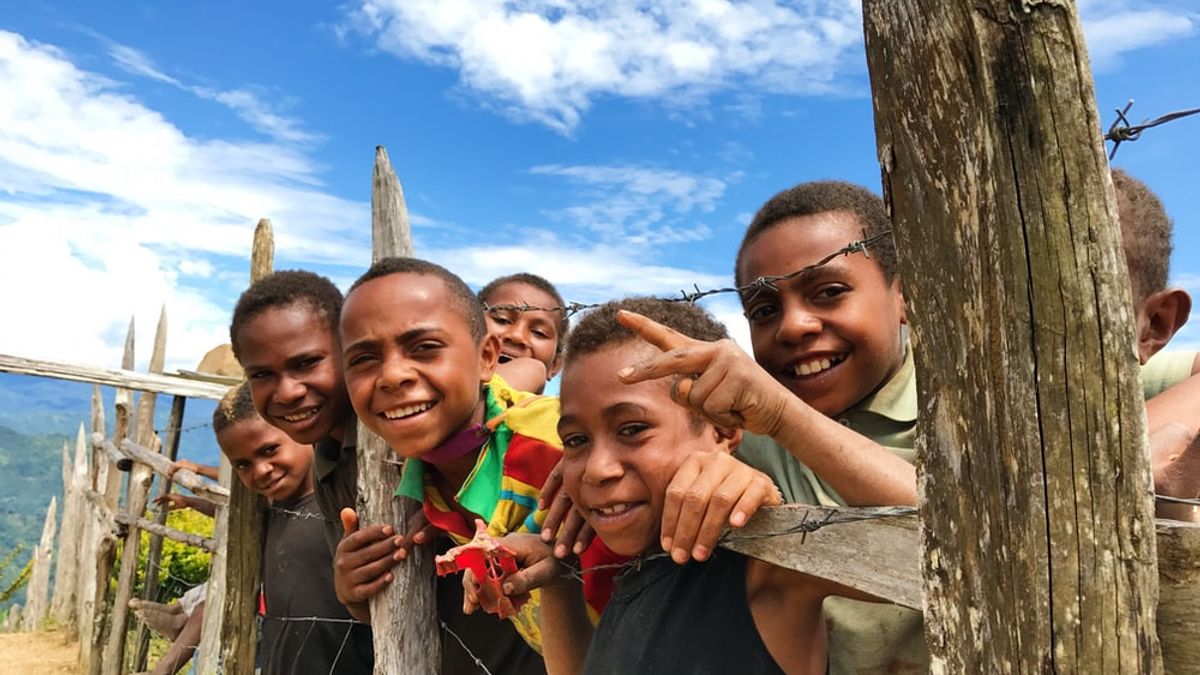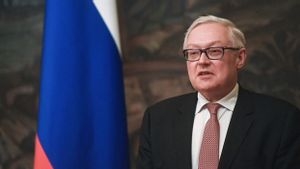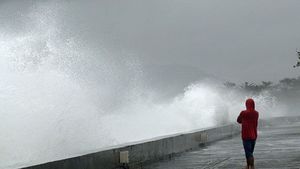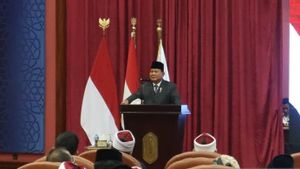JAKARTA - The Indonesian House of Representatives finally agreed to add three new provinces in Papua. At the 26th Plenary Session of the DPR RI for the period of Session V for the 2021-2022 Session Year at the DPR RI Building, Senayan, last Thursday, June 30, the Draft Law (RUU) for the expansion of Papua was approved. The three new provinces are Central Papua, Central Highlands Papua, and South Papua.
Quoted from the DPR RI website, regional expansion in Papua is based on Government Regulation Number 106 of 2021 Article 93 concerning the authority and institutional implementation of the Papua Special Autonomy policy. Aimed at accelerating equitable development, accelerating public services, as well as accelerating community welfare and elevating the dignity of the Papuan Indigenous People.
Aspects of politics, administration, law, socio-cultural unity, readiness of human resources, basic infrastructure, economic capacity, future developments and aspirations of the Papuan people are things that will be very concerned.
Central Papua is planned to have a capital city in Timika, Central Highlands Papua in Wamena, while South Papua has a capital city of Merauke.

“The expansion is one of the efforts to provide services closer to the community. This means that if the area is divided, the service, the coordination is closer to the community. This goal is to more easily serve the community in order to prosper. If the service is too far in one province, the service is not optimal,” said Vice President Ma'ruf Amin as quoted by Antara, during a working visit to Mataram, NTB on June 30.
Central Papua, which has the local name Meepago, with the capital city of Timika, will later cover six districts. The six districts are Mimika, Paniai, Dogiyai, Deyiai, Intan Jaya, and Puncak.
Central Highlands Papua, which has the local name Lapago with the capital city of Wamena, covers eight districts. The regencies are Nduga, Jayawijaya, Puncak Jaya, Central Memberamo, Lanny Jaya, Tolikara, Yahukimo, and Yalimo.
Lastly, South Papua, which has the local name Anim Ha with the capital city Merauke, covers four districts. The four regencies that will later enter South Papua are Boven Digoel, Merauke, Mappi, and Asmat.
Ethnic Diversity and Potential for RiotsThe plan for the expansion of Papua with the addition of three provinces has been in the works since early 2000. In 2007 the plan was partially realized, marked by the birth of West Papua Province with the capital city Manokwari on April 18 that year.
“In terms of the idea and idea of dividing the three regions of Papua it is quite a long time. We have been fighting the division in the south since 2002. This means that it was 20 years ago. From the documents we read, the aspiration for the expansion came from several regional heads, including Governor Lukas Enembe, who had been the chairman of the Association of Regional Heads. He once expressed his aspirations for the expansion of Papua," said Ahmad Doli Kurnia, Chairman of Commission II of the Indonesian House of Representatives on June 28, 2022, as quoted from the DPR RI website.
Although it is said to be the result of the aspirations of the Papuan people, the plan for the division into three provinces is not without opposition. In Papua there are at least 255 tribes. Each tribe has its own language and culture. So you can imagine the difficulties that must be faced to unite the 255 tribes in one Papuan culture.
Some of the major tribes in Papua that are known are the Asmat, Dani, Amungme, and Muyu. In addition to the four well-known major tribes, there are Kamoro, Moskona, Nafri, Empu, Ayamaru, Biak, Hatam, and many more.

Determining the capitals of the three new provinces in Papua is not easy. Regarding the capital city of Central Papua, for example, there is still a conflict between choosing Timika or Nabire. Timika is currently the capital of Mimika Regency, while Nabire is the capital of Nabire Regency.
“Mimika is the world's kitchen, bringing the largest income for the Republic of Indonesia. Why are we always stepchildren? Mr President must understand that. Mimika's wealth is quite a lot, it deserves to be the capital city," said Yohanes Kum, a figure from the Amungme Tribe in an oration at the Mimika DPRD on June 30, as quoted by Timika Express.
Previously, Nabire was first planned to be the capital of Central Papua Province. However, Mimika, who owns the two major tribes of Amungme and Kamoro, has objected to the appointment of the area which has the two largest tribes, Yerisyam and Wate. There is even a threat of closing Freeport if Timika is not made the capital of Central Papua Province.
This is not the first time that conflicts over Timika or Nabire have occurred. In 2003, when the discourse on the division of Papua surfaced, demonstrations in Timika claimed seven lives.
Community Participation IssuesFor some parties, the formation of the three Papua provinces is also seen as having problems with community participation. As stated by Emanuel Gobay, Director of LBH Papua as quoted by Voice Of America on June 30.
“Even though it has been ratified, it is clear to this day that no aspirations from the people have been taken up by the legislature in that formulation. Yesterday we saw that when the DPR RI went to Papua, conducting opinion meetings in Merauke and Jayapura, only the regional heads and DPRD met, while the community was not there," said Gobay.
According to Gobay, the formulation of the question of the division of Papua seems to have only been carried out by a handful of the power elite. In his view, the principle of Indonesia as a state of law does not seem to be applied in Papua.
"It is impressed that it was formulated unilaterally by the center, and was also unilaterally ratified by the center. And that was done not in accordance with the mechanism for formulating legislation, and also when the attributive legal conditions were still being processed in the Constitutional Court, and there was no policy to lift the new DOB moratorium in Indonesia," Gobay added.

Long before it was passed into a bill, in early 2008 Barnabas Suebu, who was the governor of Papua at the time, said that the concept of regional expansion that he initiated was like a joke that wasn't funny.
"We are still concerned that the first is the grand design, namely the long-term grand design because people are not stones. He will move," said Barnabas on January 31, 2008, as quoted from the papua.go.id page.
Barnabas, who was once the Indonesian Ambassador to Mexico, Honduras, and Panama, explained that when the division occurred in the mountains, what happened was not an increase in the population in that area, but a decrease.
“In Jayapura there has been an extraordinary increase in population. If so, who shall we make the district for? That's what we call grand design. Because we have to calculate the direction the population will move from where to where. That is what follows the expansion. The expansion follows economic growth and population development," said Barnabas again, at that time.
In the eyes of Barnabas, who on November 19, 2015 was sentenced to 4.6 years by the Corruption Court for the corruption of the Memberamo Hydroelectric Power Plant, the proposed expansion of Papua was only in the interests of a few political elites.
"This is in the interests of the elite. The regent who wants to finish he will make the district next door, so he can move to the other side. Or do you want to be governor, so fight for expansion," he said again.
Autonomous Region FailAnother thing that people worry about the expansion of Papua is the failure of management. It is feared that the ideal of turning the new province in Papua into an autonomous region will fail. On the other hand, it will actually burden the state finances more because of the high dependence on the state budget.
As stated by Djohermansyah Djohan, former Director General of Regional Autonomy at the Ministry of Home Affairs. In an interview with BBC Indonesia, Djohermansyah, who also served as the Acting Governor of Riau from 2013 to 2014 saw that the preparation of Central Papua, Central Highlands Papua, and South Papua to become autonomous regions was not enough.
According to Djohermansyah, to become a successful autonomous region, the three new provinces must be economically independent. Economic independence is needed for government financing, and the necessary funds must be obtained from Regional Original Revenue (PAD).
“As a result, there will be aid funds from the central government. If aid funds from the central government don't run smoothly, then of course the autonomous regions cannot run well," said Djohermansyah.

Facilities, infrastructure, and regional boundaries must also be properly prepared, so that the goals of community service can be achieved and there are no regional conflicts. If all these conditions have not been met, it is feared that the three new provinces in Papua will add to the long list of failed autonomous regions in Indonesia.
Citing data from the Ministry of Home Affairs and Bappenas in 2014, Djohermansyah said that as many as 80 percent of the new autonomous regions formed after the 1998 to 2004 reforms, totaling 223 regions, failed miserably. The failure was due to the unpreparedness of the new autonomous region concerned, and its formation was triggered more by political interests.
“It takes at least three years of preparation. If it is directly an autonomous province, the preparations may not be good. For example, public services have declined, because what was previously the main province could not. The government's financing has also become unstable. In the end, becoming an autonomous region failed," said Djohermansyah.
One more thing that needs to be taken into account is of course acts of terror. The West Papua National Liberation Army, or what is often referred to as the Armed Criminal Group (KKB), has issued threats that they will continue to carry out acts of violence if the division of Papua is realized. Now!
The English, Chinese, Japanese, Arabic, and French versions are automatically generated by the AI. So there may still be inaccuracies in translating, please always see Indonesian as our main language. (system supported by DigitalSiber.id)












